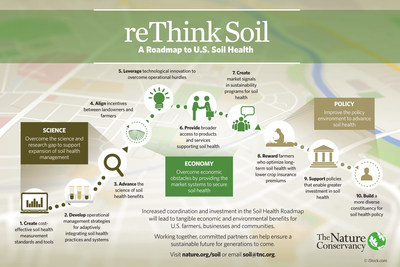NEW YORK, Nov. 1, 2016 /PRNewswire/ -- The Nature
Conservancy and General Mills today unveiled the Soil Health
Roadmap at the annual BSR Conference. Developed by an interdisciplinary team of Conservancy scientists, economists and
agriculture experts and made possible through support from General Mills, the Roadmap makes the business case for investing in
sustainable soil health practices to achieve unprecedented economic benefits for U.S. farmers and businesses, as well as
significant conservation outcomes for generations to come.

"Healthy soils are the cornerstone of life on Earth, yet they are increasingly rare with less than 10 percent of U.S. soils
managed optimally today," said Michael Doane, Director of Transforming Working Lands for The
Nature Conservancy. "With increasing demands on our lands to produce more food, fuel and fiber, now is the time to rethink soils
and invest in the science, new business models and policy signals that can restore the long-term health and sustainability of our
soils."
The Soil Health Roadmap outlines 10 key steps spanning science, economy and policy priorities to achieve widespread adoption
of adaptive soil health systems on more than 50 percent of U.S. cropland by 2025. (See accompanying infographic)
"As a global food company, it's imperative to protect the natural resources and communities upon which our business depends.
In our case, the foundation is soil health," said Jerry Lynch, Chief Sustainability Officer at
General Mills. "The goal is to provide a thoughtful strategy, raise awareness about the critical role that soil health plays in
environmental sustainability and to encourage transformation in agricultural supply chains. We cannot do this alone. But,
together, we can get on a path to healthier soil and more sustainable agriculture systems."
At full adoption, Conservancy scientists estimate nearly $50 billion in societal benefits could
be realized annually. At 50 percent adoption, improved soil health would provide $1.2 billion in
annual net economic gains for farmers, and $7.4 billion in water and climate benefits. These
benefits include:
- Mitigating 25 million metric tons of greenhouse gas emissions -- the equivalent to taking 5 million passenger cars off the
road for one year
- Reducing 344 million pounds of nutrient loss to the environment
- Eliminating 116 million metric tons of soil erosion
- Creating 3.6 million acre-feet of available water capacity in cropland soils
"We know how to build healthier soils, and the benefits are real. It is simply a better way to farm," said Tim Smith, an Iowa farmer implementing soil health practices with technical
assistance from the Conservancy. "I am protecting my soil from erosion, greatly reducing my impact on water quality by reducing
nitrate and phosphorus loss, and improving soil health that will provide for the long term sustainability of the land."
Soil Health: A Global Priority for Conservation and Business
As our global population grows, soil health must be both a conservation and a business priority as growers struggle to produce
more food. The Food and Agriculture Organization of the United Nations estimates a 60 percent increase in food production is
required by 2050.
Increased investment and coordination in the priorities called for in the Soil Health Roadmap can create a transformative
shift in the way America's croplands are managed, paving the way for tangible economic and environmental gains for future
generations.
By elevating the role of soil health in U.S. cropland management systems and measuring both the economic and environmental
benefits, we can advance a scalable, sustainable model for farming systems around the world.
General Mills and The Nature Conservancy are hosting a panel discussion called The Real Dirt: A Roadmap for Soil
Health on the opening afternoon of the BSR conference. The event is Tuesday, November 1 from
2:00 p.m. – 3:30 p.m. in the Empire State Ballroom V at the Grand
Hyatt in New York. To register for this event, visit bsr16.org/register/roadmap-to-soil-health.
Learn more about the Soil Health Roadmap at www.nature.org/soil.
About The Nature Conservancy
The Nature Conservancy is a leading conservation organization working around the world to protect the lands and waters on
which all life depends. Together with its more than 1 million members and 600 scientists, the Conservancy has protected 120
million acres of land and 5,000 miles of rivers worldwide, and operates more than 100 marine conservation projects globally. The
Conservancy works on the ground in 69 countries and all 50 U.S. states. To learn more, visit www.nature.org.
About General Mills
General Mills is a leading global food company that serves the world by making food people love. Its brands include
Cheerios, Annie's, Yoplait, Nature Valley, Fiber One, Haagen-Dazs, Betty Crocker, Pillsbury,
Old El Paso, Wanchai Ferry, Yoki and more. Headquartered in Minneapolis, Minnesota, USA, General Mills had fiscal 2016 worldwide sales of US $17.6 billion, including the company's US $1.0 billion proportionate share of
joint-venture net sales.
Photo - http://photos.prnewswire.com/prnh/20161031/434470-INFO
Photo - http://photos.prnewswire.com/prnh/20161031/434469
Logo - http://photos.prnewswire.com/prnh/20161031/434469
To view the original version on PR Newswire, visit:http://www.prnewswire.com/news-releases/healthy-soils-could-deliver-nearly-50-billion-in-benefits-annually-300354629.html
SOURCE General Mills